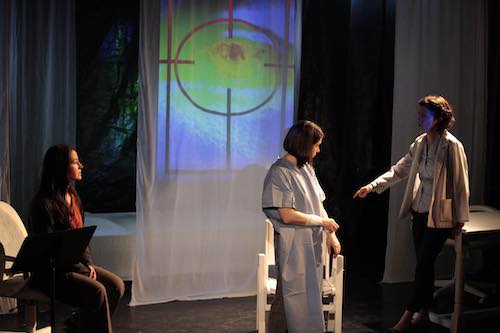 Everything I Couldn’t Tell You delves into the power of culture to heal, at the Theatre Centre in Toronto
Everything I Couldn’t Tell You delves into the power of culture to heal, at the Theatre Centre in Toronto
Megan is an Indigenous woman who has recently been woken from a coma. The procedure has damaged her brain, unleashing painful memories that drive her to alcohol and sudden, brutal violence.
Can two deeply damaged neuroscientists help her heal? This is the basic dramatic question posed by Everything I Couldn’t Tell You, currently playing at The Theatre Centre as part of the The Riser Project 2018.
At first, Megan is very antagonistic towards Cassandra, the neuroscientist who released her from her coma. After a steady stream of vitriol in which she berates her therapist for re-opening a deep wound and failing to properly tend to it, she makes her pivotal request: that Cassandra find her an Indigenous therapist that speaks her almost-dead language—Lenape.
It is here that playwright Jeff D’Hondt’s central idea begins to take shape: the healing power of reclaiming your language and culture. The script strives to acknowledge that people can carry communal trauma from a shared past. There is little in the way of explicit reference to colonization and the harrowing history of Indigenous communities yet it is very clear that Megan is one of many suffering prolonged psychic damage.
The story also posits an experimental form of therapy where art and neuroscience are combined. Despite a lot of technical jargon, the play never feels burdened by it. The science of the therapy sessions and its references to neural pathways and the cause-and-effect chain reactions are comprehensible.
I found it hard to invest in PJ Prudat’s occasionally stilted portrayal of Megan. Too often, I could see the gears shifting, was too aware of the emotional beats she’s negotiating, especially when addressing an invisible other out towards the audience. In the therapy scenes, though, between herself and Cheri Maracle’s Alison (the Indigenous neuropsychologist brought in at Megan’s request for a Lenape speaker), the two settle into a comfortably naturalistic dynamic. Her slowly evolving trust of Alison is particularly well paced.
The trope of the tortured healer is fairly standard in therapy dramas and so the conflicts that develop between Cassandra, Alison and Megan feel somewhat familiar. Both Cassandra and Alison have lost loved ones. Their grief informs their work and a precarious balance exists between the healing and harming effects of their individual traumas.
Both Maracle and Prudat quickly and frequently break down into tears as they relive painful memories. While their heightened emotions were displayed quite explicitly, I rarely felt those emotions with them. Jenny Young’s Cassandra is significantly more stoic and the moments when her facade cracks were, for me, more subtle and resonant.
I am particularly drawn to work that explores themes deeply rather than poking timidly at the periphery of intriguing ideas. To my delight, this piece takes it time to immerse you fully in both the immediate drama of these women and the broader context of their situation. D’Hondt’s characterizations are vivid and compelling yet his script falters somewhat in the intended naturalism of the dialogue. Characters occasionally utter off-the-cuff kernels of pithy wisdom that feel less like genuine character interaction than the playwright telling us the deeper significance of a situation.
Director Erin Brandenburg has crafted an intense and visually dynamic production that feels fluid and organic despite a proliferation of synchronized technical elements. Multi-media shows are hard to manage and the coordination of multiple projections is particularly tricky. With the exception of a few subtitles getting obscured at certain angles, all the tech here feels seamlessly integrated into the world the characters inhabit. Kudos to the production team: Jordana Weiss (Stage Manager) and Pip Bradford (Production Manager) and Steph Raposo (Technical Director).
From the playwright’s note in the program, I gather that this is a work in progress. It is an important work, that is clear even from this stage of its development. D’Holdt has explained that his script showcases an imperfect, fractured version of the Lenape language, one that has been damaged (much like the tormented Megan) by a history of colonization and (like her) needs care and attention.
Details:
- Everything I Couldn’t Tell You is playing until May 12, 2018 at The Theatre Centre (1115 Queen St. West)
- See show page for performance times
- Tickets are $5 to $60
- Tickets can be purchased online or by phone 416-538-0988
Photo of Cheri Maracle, PJ Prudat and Jenny Young by Ross Spencer.
